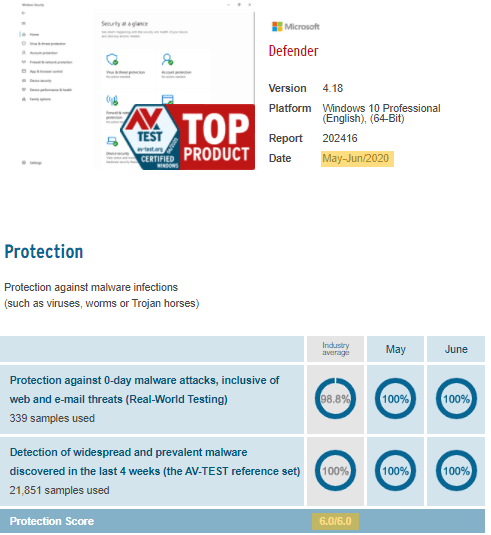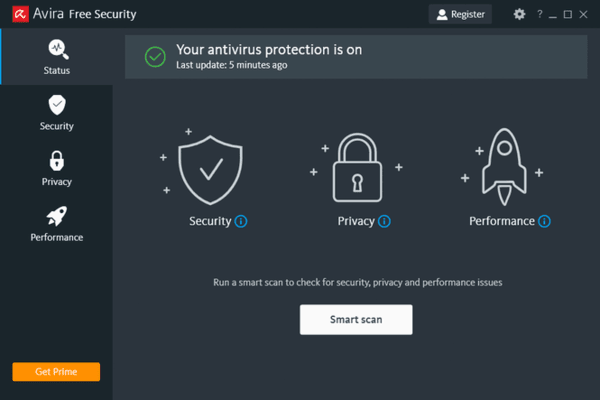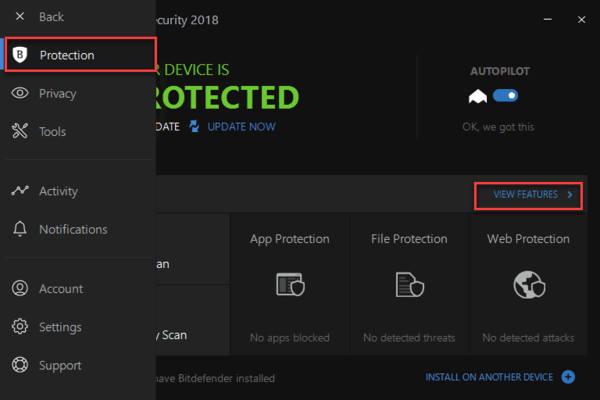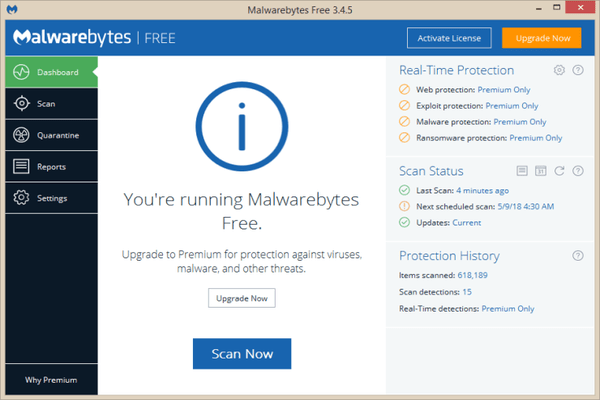Cyber threats have been on the rise lately. Individuals/organizations regularly lose their information through computer-related attacks.
Some of the attacks could cause the documents to get corrupt.
Others may make them completely missing and cause system malfunction. In some instances, the documents would be encrypted with ransomware.
Whether you have experienced any of this or not, it is important to protect your devices with antivirus applications. Antivirus programs can shield your documents and entire system from hackers. They can help protect your privacy, protect your systems against ransomwares, and generally maintain integrity.
Microsoft Defender, which many users still dub as Windows Defender (its initial name), is an in-built antivirus that comes with MS Windows. The program promises to deliver comprehensive real-time protection against viruses, spyware, and malware across apps, email, the web, and the cloud.
Despite Microsoft’s claims, many people keep asking questions like:
- Is Windows Defender, the in-built Microsoft Windows antivirus, fast enough to eliminate threats without slowing your PC down?
- Can it handle modern-day complicated malicious threats such as spyware and ransomware?
- Do I need more protection alongside it?
- Where it lacks?
All these questions are valid.
Let us tell you one thing, Microsoft understands the threat posed by viruses. That’s why the organization ensures that every Windows system has Windows Defender pre-installed in it. The application delivers real-time security protection against ongoing threats such as spyware, malware, viruses, and lots more.
However, in the past, Defender has not lived up to its name.
Windows Defender is designed to protect your computer from viruses and malware. The antivirus is pre-installed already if your PC is currently running on Windows operating system. Microsoft offers it for free as a built-in security tool.
The new version, also known as Microsoft Defender Antivirus, can operate impeccably on Windows 10 computers. This allows it to detect and eliminate threats without affecting system performance.
While it has improved significantly in the recent past, you cannot use it as standalone antivirus. The antivirus does not receive frequent updates, so it cannot offer advanced protection against the latest malware threats. That is why you should consider using it together with another free antivirus.
Read on to find out whether Windows Defender is good enough, its main features, reliable free antivirus you should combine it with, and much more.
What are viruses
A computer virus is an unwanted program that finds its way into a host system without the knowledge of the user.
Some of the viruses replicate and spread when they gain access to a system. Computer viruses are developed to perform unwanted and malicious actions on the target devices. Upon successful installation, these malicious programs can delete data, encrypt or corrupt files, and affect the performance of the system.

An antivirus program such as Windows Defender fights against the activities of a virus program on the system. It recognizes, deletes, halts, and removes viruses from the system.
Good antivirus programs would eliminate virus applications or disable them so that they don’t keep infecting the system and cause more damage.
A computer without an antivirus remains unprotected and open to malicious activities. Such unprotected systems would let any virus enter that comes its way.
Fortunately for Microsoft users, Windows comes with the in-built Windows Defender that can secure their PCs from threats. Over the years, MS Defender Antivirus has evolved enough to register itself among the best anti-spyware and antivirus applications.
What damage can a virus do to a PC?
When a computer becomes infected with a virus, the following can happen to the host PC:
- Delete the system files
- Corrupt files
- Destroy operating system files
- Cause program malfunction
- Encrypt files for ransom
- Reformat the system
- Lock the system and render it unusable etc
Is your PC better off without an antivirus?
A PC without an antivirus is vulnerable to cyber-attacks, and a virus can inflict severe damage on your computer and can also destroy your reputation. When your PC gets attacked, you can lose your files, your system may get formatted, crash beyond repairs, and you can be held for ransom, and so on.
Not having a protective mechanism in the form of antivirus is like providing a clear pathway for hackers to gain access to your PC. If you want no damage to your files and system, you must install a third-party antivirus or enable Microsoft Windows’ in-built Defender on your PC.
What is Windows Defender?
Windows Defender is a program designed to protect computers from malware and viruses. Initially, it was available as a free anti-spyware tool for Windows XP, Windows Vista, and Windows 7. However, it has evolved into a fully-fledged antivirus program to replace Microsoft Security Essentials for Windows 8 and beyond.
Prior to Windows 8, the software only offered protection against spyware. It involved multiple real-time security agents who monitored common changes in the system caused by malware.
There was also integrated support for Microsoft SpyNet, which allowed users to report anything they suspected to be malware. Windows Defender protection against viruses was included in Windows 8. It uses a similar anti-malware engine and virus definition as the Microsoft Security Essentials. If you are using Windows 10, you can control the antivirus in the Windows Defender Security Center.
It comes pre-installed on Microsoft Windows 10 at no extra cost for users. Here are the perceived benefits of free Microsoft antivirus and antimalware program:
- Protects your system and ensures that you are not a victim of cyber crimes such as identity theft
- Ensures that the data on your computers do not get corrupted
- Speeds up your computer
- Safeguards your shared networks against Trojan Horses.
- Protect your cloud infrastructure.
- Saves you time, money, and reputation
- Ensures data compliance
Having an antivirus program installed on your PC is extremely important; however, the question remains, is Windows Defender good enough in 2022?
Hackers and viruses are getting more sophisticated as the days go by, and individuals/organizations need to protect their devices at the very best.
It means they must deploy tools and technologies that can limit virus attacks, which can lead to reputational damage, business disruptions, and data losses. Cybercrimes are getting more frequent, and it has been reported that more time and money are required to resolve a virus or hack issue in 2022.
Cybercrimes are rapidly evolving. It seems that Windows Defender now can keep up with the rapidly advancing threats. It is a result of the significant investment Microsoft has made in the advancement of the Defender.
Individuals and organizations face an increasing landscape, which includes information threats, supply chain attacks, ransom, and so on. These cybercriminals are deploying new and sophisticated technologies much faster than a lot of antivirus programs. However, this is no longer the case with Microsoft’s Defender.
Early years of Microsoft Windows Defender

Windows Defender has existed since 2006, but its beginning was far from successful.
Independent testing organizations verified that the protection technology developed by Microsoft trailed behind other top virus applications. It had a low detection rate and exposed users’ PC to a lot of threats.
Despite Microsoft’s tremendous investment in ensuring technology comes to speed, its native antivirus still trailed behind other leading anti-virus applications for an accountable number of years.
In the early years, PCs running on Windows would reportedly crash, especially when you run an update. This crash was due to some of the flaws that come with the Windows operating system.
Microsoft Windows update has been known to break Windows Defender, which would make your system vulnerable. As a result, most people do not rely on the Defender for virus security and system protection. Many who cannot afford premium solutions have turned to free third-party firewalls and antivirus programs.
Some circumstances can force Windows Defender Antivirus to crash while running a complete system scan. This would lead to errors appearing in Windows Security and the PC’s systems event viewer.
Why the crash?

System crash as a result of using Windows Defender to run a full system scan is tied to some files that come with double dots in their file names.
Examples are Thisisnuts..Doc, which is very similar to the Y2K Bug. Windows attributed this issue to the Windows Defender intelligence virus definition that came built-in with older updates.
In some instances, tech-savvy users can fix this on their own by merely using the service manager to spot and stop it. However, your system can be compromised almost immediately before the issue gets resolved. Also, people with less technical knowledge are not able to get rid of this issue, which led to system compromise.
Windows Defender in 2022
As stated earlier, in the past, most experts would advise you not to rely on MS Windows built-in antivirus due to its unreliability.
However, that is no longer the case since 2019.
Before now, Windows users would usually deactivate Windows Defender and install other third-party antivirus programs. Things have significantly turned around.
In 2020, Microsoft Defender was voted one of the best antivirus applications. AV-Test, an independent testing lab, carried out thorough testing in May-June 2020. Windows Defender got a 6.0/6 score in the AV-Test report, which is quite incredible.

AV-Test also ranked Windows 10 built-in antivirus in the top three for best antivirus programs. The top two are premium antivirus programs, while Windows Defender is free.
Currently, it provides a good level of protection from all types of computer-related viruses. It provides anti-ransomware protection, comes with parental control features to keep kids safe online, has a vault, protects cloud infrastructure, maintains data integrity and so much more.
Some people still doubt the efficiency of Microsoft’s Defender due to its reputational hangover. People seem to have a perception that Microsoft Defender is still unreliable as it used to be in the past.
However, some have realized its potential, and lately, its usage and perception have dramatically improved. Microsoft has added a lot of impressive algorithms to Windows Defender to make it more efficient and reliable.
The protection technology combines a wide range of sophisticated features and automatically carries out automatic and in-demand scans for malicious applications. Microsoft Defender also secures users’ PCs against dangerous URLs and the networks against DDoS attacks.
What are the features of Windows Defender?

Microsoft’s free antivirus program offers advanced protection via the Microsoft Defender ATP. It incorporates machine learning, artificial intelligence, and virus threat resistance research.
Also, when enabled, it secures cloud infrastructure to ensure maximum protection for PCs and networks. Microsoft Defender has been upgraded in 2020 to become next-generation system protection with the following attributes:
Real-time antivirus protection
An antivirus program is unreliable if it cannot accurately identify and eliminate threats. The same also applies if it erroneously detects safe software as dangerous.
Windows Defender combines artificial intelligence (AI) and Microsoft’s cloud infrastructure to examine billions of data signals in real-time to avoid these issues.
AI technology identifies genuine threats while allowing safe programs to pass. In a test involving over one million samples, the Windows Defender performed exemplarily with 100% accuracy.
Another crucial component is the prompt detection of threats. Windows Defender conducts real-time and continuous monitoring, detecting and stopping attacks.
This approach used by Windows Defender is so effective to identify and stop emerging threats. For instance, it can stop zero-day attacks, a newly discovered vulnerability. Real-time monitoring and detection is a crucial feature since cyberattacks are evolving every day.
Malware protection
One of the most vital features of any antivirus program is to protect against malware. The previous version of Windows Defender was a basic security option that was highly unreliable.
Microsoft upped its game by substantially upgrading the Windows Defender software and even renamed it “Microsoft Defender” antivirus. Today, it is one of the best antivirus programs for protecting computers.
AV-Test Institute is an independent IT security organization that tests and rates antivirus programs. As noted earlier, it recently conducted thorough testing on Windows Defender and gave it a 6.0/6 score, a perfect protection rating.
Windows Defender identifies unsafe apps and those not recognized as malware by using Microsoft cloud infrastructure data.
Behavioral-based monitoring
It carries out threat detection by studying every file and application’s behavior on the PC.
Microsoft Defender detects and blocks apps that the software finds behaving abnormally. It also automatically blocks apps that its database regards as unsafe for your PC. Other malware protection programs cannot detect some of these shady apps.
Regular updates
Windows Defender comes with an update patch that can automatically scan or search for updates from Microsoft cloud servers.
Upon detecting an update, it automatically downloads and installs it on your local PC to ensure the latest protection capabilities. As new viruses emerge, updates constantly arrive with new malware definitions to ensure non-stop system security.
So, you do not need to manually search for updates with Windows defender. Once a new virus definition arrives, it automatically downloads and installs to keep your system protected.
Cloud protection system
Microsoft engineers, carry out a regular study of emerging threats in the cyber world and automatically block them through windows defender. Aside from protecting individual PCs, it also protects cloud systems.
Lately, many organizations are migrating to the cloud, triggering the need for cloud security solutions to provide multilevel protection and control.
Windows Defender can protect your cloud systems against DDoS attacks (Distributed Denial of service). DDoS attacks occur when a huge amount of traffic is sent to the cloud servers to slow down services or to completely shut down the processes.
Windows defender monitors and significantly reduces the chances of DDoS attacks on your cloud infrastructure. It also ensures data security, 27/7 cloud system availability, decent flexibility, and lots more.
Regulatory compliance
Windows defender ensures that organizations are regulatory compliant. It helps manage system files, enhances cloud system infrastructure, and ensures data integrity, which is paramount for compliance.
Parental control
Everyone wants to keep kids safe online. And they should. One of the biggest challenges for parents and guardians is being able to monitor what their kids and wards are doing on the internet.
Advancement in technology has brought about easy access to illegal and potentially harmful websites that cannot be effectively controlled without an antivirus.
A parent or guardian would not be able to easily keep an eye on what the kid is doing with their computer. However, the Windows defender is the solution to this problem.
It provides a robust monitoring tool that can enable you to control what your kids are doing. It provides activity logs in the form of reports. Windows Defender filters websites upon activating parental control features, to protect kids.
It can also limit the time kids spend on the internet, thereby making them more productive in other areas. It has a web console where parents and guidance can monitor kids’ activities in real-time as well.
With parental control, you can also define when your kids can use their PCs and devices. Windows Defender has a family option page/console, which can enable you to view what your kids are doing directly. It also helps in monitoring activities across multiple systems at once.
Microsoft Defender’s anti-spyware technology
Lately, a lot of advanced spyware tools have gained popularity among users to monitor an individual or organization. Microsoft Defender comes with a sophisticated and robust antispyware technology that goes the extra mile to ensure you do not get spied on. It quickly scans through all the data and apps on your PC to check (and remove) spyware signatures.
If it finds anything suspicious, it will help the user get rid of them. Windows Defender also keeps an eye on other legitimate software and application attached to spyware. If you are looking for ease of use and simplicity and don’t want unnecessary applications clustering your PC, it can play a significant role.
Resource management
When it comes to computer resource management, no antivirus application is as efficient as Windows Defender. Since it belongs to the same parent firm that develops Windows operating system, it uses fewer computer resources. That means the PC would have more space and processing power.
Controlled folder access
This is the latest addition to the anti-malware application. It provides an additional layer of protection against ransomware. It also protects specific folders, files, and even some PC RAM aspects against untrusted applications trying to gain access.
You may need to reconsider your stance if you have taken Windows defender for granted because of its previous reputation. Only a few antiviruses out there offer a controlled folder access feature.
Ease of setup
You don’t need to be tech-savvy to set up Windows Defender, which is one of the most vital points of the application. It comes fully integrated with your windows operating system; therefore, you need not download, install, or set up anything. As soon as you install Windows, it starts protecting your system automatically, which is different from other antivirus applications.
However, if you need to change Windows Defender settings, you can still do that very easily. The steps are basic enough, and you can quickly change whatever you want without needing to go through the documentation. With it, you can securely carry out a full system scan, custom scan, or offline scan with just a click.
Flexible status check
You can easily check the status of your Windows Defender through the icon at the status bar. When you click on it, you would be able to view your current Defender status, see the functions of the firewall, and adjust notification rules. You can also restore the firewall to the default state, troubleshoot your internet network, allow specific apps through the firewall, and so much more.
App and browser control
Windows Defender comes with browser and app control features that can let you keep full command of crucial functionalities. It has a state of the art Windows Smart screen that you can easily configure to warn, block, or ignore specific files and applications. Windows Defender also uses the latest technologies such as DEP SEHOP Control Flow guard, ASLR, and much more to hinder all the routes through which a cyberattack can happen.
Cost-effectiveness
Microsoft Windows Defender is cost-effective, and you don’t have to pay for a monthly or yearly subscription, but you still get maximum PC security. If you are low on budget and don’t want to spend extra money on antivirus, you should consider migrating to the Windows operating system. The system will enable you to use Windows Defender for free.
Supercharge your PC
Windows Defender ensures that your PC is optimized and is running as fast as possible. The consequences of a Virus attack on your PC can result to slow processing speed, system crash, data compromise, and lots more.
It ensures that the system remains protected; the hard drive is optimized and operates with good speed. This can save you a tremendous amount of time and effort.
Firewall
Windows Defender also works as a computer firewall, all thanks to its ‘comprehensive’ protection approach. It monitors outgoing and incoming traffic on your PC network. The program double checks every incoming and outgoing file through the network. It also checks all the sites you visit and block out a malicious website from your network.
It would ensure that you do not unintentionally download malware or access unauthorized sites. You can end up exposing your PC to different cyber threats while merely accessing unauthorized sites. These attacks include ransomware attacks, hacking attempts, spyware, malvertising or adware, and lots more.
Protects your passwords
Windows Defender provides a secure login for users to protect their passwords. When your passwords are compromised, hackers can use them to blackmail you, steal your funds, or gain access to other confidential information.
While its password protection feature might not be as good as some of the best password managers out there, Windows Defender offers quality password protection for free.
Friendly user interface
Windows Defender comes with a simple/friendly user interface. With just a single click, it can purge all suspicious applications. It requires minimal user input to carry out its functions, and in most cases, need no configuration.
What features does Windows Defender lack?
Web protection
Also known as DNS filtering, web protection is a crucial safeguard against viruses and malware. Most phishing emails bypass antivirus programs by using malicious links instead of file attachments to inject malware.
Windows Defender offers web protection on the Edge browser. However, since most people use Chrome, they might miss out on this crucial feature that blocks malicious sites.
Password management
Another area that Windows Defender has failed to address is robust password management. Because people have multiple passwords to deal with, they use weak combinations so they can remember. Some even reuse the same passwords for various web applications.
Windows Defender does not offer a password management tool to recommend and store robust passwords.
Cloud backup
A cloud backup is an imperative protection feature against malware and virus attacks that destroys your data. It safely stores your files, and you can quickly restore them at any time. Unfortunately, Windows Defender does not offer this protective component.
Luckily, you can use Windows Defender together with another free antivirus for added protection. There are many other free antivirus software that offers better malware and virus protection than Windows Defender. For instance, some even provide a Virtual Private Network (VPN).
However, free antivirus programs can be lacking in other areas. Maybe their malware scanner is not sufficient, or real-time protection does not work well. Actually, there is no free antivirus that will offer complete protection.
That is why you should consider using a free third-party antivirus alongside Windows Defender to give your PC decent protection. While combining two free antivirus programs is better than using one, you should never trust your PC to be 100% safe.
If you store sensitive data such as your passwords, pictures, or bank information, you should consider investing in an affordable premium antivirus like Norton 360.
How does Windows Defender compare with other free antivirus programs?
Kaspersky Security Cloud Vs. Windows Defender

Kaspersky Security Cloud is Kaspersky’s free version that offers more advanced cybersecurity features than Windows Defender.
It has a cloud-based malware scanner and continuously updates the database with the newest malware threats. Although Windows Defender has a cloud protection feature, it cannot match Kaspersky Security Cloud.
During our testing, the antivirus effectively detected the phishing sites we tried to access and blocked many malware sample files. Since the software receives frequent updates, it offers better protection than Windows Defender.
Besides, impressively, Kaspersky’s interface is much easier to use than Windows Defender.
The best part is that the Kaspersky free antivirus also offers a password manager and VPN, two critical security tools that Windows Defender lacks. While the VPN provides only 200MB daily data, it has pretty decent speeds.
Bottom line:
Overall, Kaspersky Security Cloud offers much better features and protection than Windows Defender. The malware scanner is faster, and the detection rate is near-perfect. If you upgrade to the paid version, you will get more features such as safe money, privacy cleaner, webcam protection, anti-spam, etc.
TotalAV vs. Windows Defender

TotalAV is a user-friendly antivirus that actively protects your PC from malicious malware and viruses. The free version comes with a range of essential features better than what the Windows Defender offers. We used the Junk Cleaner to scan our computer and freed nearly 5 GB of our hard disk space.
During our testing, it identified and blocked all the sample malware files. On the downside, you have to upgrade to the paid version to get real-time protection, which Windows Defender offers for free.
The paid subscriptions offer premium features such as Safe Browsing VPN, Ad-Block Pro, and password manager. Although Windows Defender does not provide these features, other free antivirus programs like Kaspersky offer them for free.
Bottom line:
TotalAV offers a lot of functionality than Windows Defender. The PC optimization feature will help to enhance the performance of your device. Although it does not provide real-time protection on the free version, you can upgrade to the paid version to access it and many more features.
Avira vs. Windows Defender

Avira antivirus program comes with many features, even on the free version, including an integrated firewall, real-time malware protection, free VPN, and more.
The malware scanner performed exemplary during our test identifying 100% of the malware samples we used. Also, it has an interesting ‘custom scan’ feature that allows you to only scan for specific malware like spyware or ransomware.
Avira’s paid version (Avira Prime) offers additional features such as PC optimization tools and a password manager. There is also USB scanning, although Windows Defender provides external device scanning for free.
Bottom line:
Avira’s malware scanning and real-time malware detection perform better than Windows Defender. While the antivirus offers a decent VPN, it lacks crucial features such as USB scanning, available on the Windows Defender for free. Nonetheless, it has several premium features, including PC optimization tools and password manager, making it a good Windows Defender complement.
Bitdefender vs. Windows Defender

While Bitdefender’s free version is pretty basic, it offers a highly effective malware scanning engine that is surprisingly lightweight. It detected 100% of the malware sample files we used during our testing. This is much better compared to our experience with Windows Defender.
The paid version offers great security tools such as an integrated VPN, secure banking tools, customizable scans, and parental controls. Even though Windows Defender has decent scanning options, it lacks essential tools like parental controls and VPN.
Bottom line:
Bitdefender malware scanning engine performs better than Windows Defender. While the free version is lightweight, it is very powerful with real-time protection. The premium version comes with crucial features such as a VPN and parental controls, which Windows Defender does not offer.
Malwarebytes vs. Windows Defender

Malwarebytes free version comes with limitations, offering malware scanning only and no real-time protection. However, it works well when combined with Windows Defender.
The dashboard looks complicated, but it is straightforward to use and navigate. Everything is laid out, and the scan button will appear once you open the program.
Malwarebytes Premium version is a secure and highly-capable antivirus. It offers protection against multiple threats, including ransomware and zero-day attacks.
Bottom line:
Although Malwarebytes is good at identifying and removing malware from PC, it is not powerful enough to act as standalone antivirus. However, you can combine it with Windows Defender for better protection.
Final notes
Lately, Microsoft has significantly invested in Windows Defender, and this has ensured greater efficiency. Research carried out by independent labs in 2019 found that it blocked 99.9% of the known malware programs successfully.
As per the 2020 tests, Windows Defender Antivirus blocked 100% of all brand new viruses successfully, which is greater than the detection rate of other major antivirus programs.

In essence, Windows Defender is good enough for your PC in 2022; however, this was not the case some time ago.
Previously the antivirus program lacked the sophistication to handle modern threats. It also used to crash a lot during updates, which has, unfortunately, given it a bad reputation even in 2021. However, Windows Defender currently provides robust protection for systems against malware programs, as demonstrated in numerous independent tests.
There is absolutely nothing wrong with using Microsoft’s built-in antivirus as your choice of system protection in 2022. It comes pre-installed with windows without additional charges. Moreover, it is convenient to use, especially for less tech-savvy people who may not understand how to configure other premium antivirus applications for optimum results.
Having an antivirus program like Windows Defender installed on your PC is a no-brainer. Not only can it help save a lot of reputational damage, but also you would end up saving money as it is free. Microsoft Defender’s importance is apparent, and no matter the level of threat, it can keep you secured.
If you are looking for a top-notch antivirus program and fancy simplicity, too, then Microsoft Defender is the answer. But it is not the only top free antivirus program out there. For your antivirus AB testing, we recommend you not to settle on Windows Defender only. Instead, try out some other alternatives like Kaspersky and Bitdefender, too. The best part is it won’t require much work from your side to test another antivirus app.
The best way to protect your PC is to combine the Windows Defender with another reliable free antivirus. However, you can never have 100% protection with free antiviruses, especially if you have saved sensitive information on your PC. That is why you need to upgrade to a budget-friendly antivirus like Norton 360.
Windows Defender FAQs
You have to do nothing if you are using Windows 10 since the software is automatically installed and activated. However, if you are not using a Windows operating system, you will have to download and install the antivirus software.
Windows Defender does not block other antivirus programs. In fact, it will turn itself off if it detects that you are activating other antivirus software. If you turn off the alternative program, Windows Defender will automatically reactivate to ensure your PC is always protected.
While Windows Defender provides decent cybersecurity protection, it cannot match many premium antivirus services. It can serve you if you are just looking for basic internet protection. However, if you have sensitive data such as bank details, login info, or private files, Windows Defender may not be an ideal option.
If you have a Windows 10 Enterprise software license, the protection will extend to your mobile devices. You can download and install the Windows Defender app from Google Play Store. Sadly, Microsoft hasn’t released a version for iOS devices.
Nonetheless, mobile devices are not susceptible to attacks as PCs, and if you are using Android and iOS operating systems, you will receive frequent security features. Therefore, expect to use the Windows Defender on your laptop and desktop devices.
Yes. Windows Defender will remove malware from your PC if it detects it. However, since Microsoft doesn’t update the Windows Defender frequently, new malware will not be detected. Therefore, you cannot entirely rely on Windows Defender as your primary antivirus. There are better free antiviruses that are regularly updated to handle the newest threats. However, they still cannot offer guaranteed malware protection like premium ones.
Yes. The Windows Defender browser extension can protect you from various cybersecurity threats such as phishing scams and malicious sites. However, the protection is just basic because the antivirus is not updated enough. You will be much safer with budget-friendly premium antiviruses like Norton 360.
Windows Defender is completely free for PCs with Windows 8 and above. Nonetheless, there are enhanced free antivirus programs that are updated regularly than the Defender.
Microsoft has not been keen to update the software to handle the latest malware trends. So, using it as your standalone antivirus can leave you vulnerable to spyware, ransomware, and other advanced forms of malware. It is recommended to combine Windows Defender with another reliable antivirus such as TotalAV.




